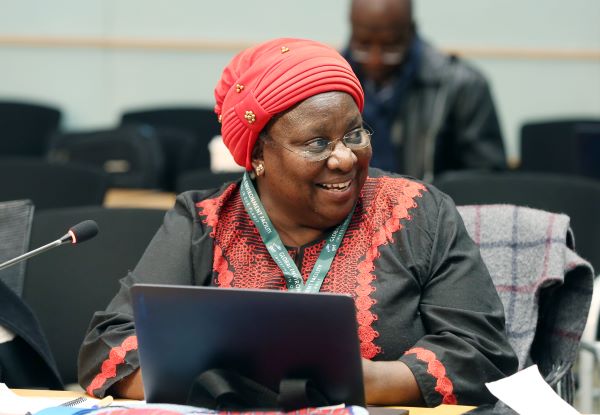First published on 11/10/2019, and last updated on 02/04/2020
By Jessica Campese, ICCA Consortium Collaborator / Advisor on Governance and Human Rights, with inputs from Holly Jonas, ICCA Consortium Global Coordinator.
At its 57th Council Meeting from 17-19 December 2019, the Global Environment Facility (GEF) Council approved the ‘Inclusive Conservation Initiative’ concept, which aims to “assist Indigenous Peoples and Local Communities … in their efforts to continue to safeguard a significant fraction of Earth’s natural ecosystems …” (GEF/C.57/07, para 19(c)). This Initiative is a welcome development and we need to work hard to ensure it is firmly grounded in the empowered leadership and self-determined visions and priorities of Indigenous peoples and local communities who are taking care of their collective territories of life.
READ MORE: “Whose Inclusive Conservation?” – ICCA Consortium Policy Brief No. 5 (English| Español)
The GEF Council Consultation with Civil Society Organizations (CSOs) that preceded the Council Meeting included a focus on combatting illegal wildlife trade. We were heartened to hear the many strong voices speaking to the power and leadership of Indigenous peoples and local communities in these efforts.
ICCA Consortium representatives Giovanni Reyes and Jessica Campese, together with a number of other Members, Honorary members and partners, joined the GEF CSO Network at these meetings, including to highlight the diverse contributions of ICCAs—territories of life and advocate for their appropriate recognition and support. This article highlights some key meeting discussion points and outcomes and provides links to further information.
Sources: IISD Reporting Services, GEF summary, 57th Council Meeting documents and participant notes.
1. CSO Consultation with the GEF Council (16 December 2019)
(Section adapted in part from IISD Reporting Service summary of proceedings.)
The GEF Council Consultation with CSOs included, among other topics:
- A consultation with the GEF CEO and Chairperson Naoko Ishii;
- Presentations and plenary discussions on civil society engagement in the proposed GEF Private Sector Engagement Strategy;
- Presentations and plenary discussions on CSO roles in enhancing GEF project sustainability; and
- Presentations and two ‘roundtable’ discussions on combatting illegal wildlife trade.
Complete videos are available online of the morning session and the afternoon session.
The afternoon session on combatting illegal wildlife trade opened with a video discussing Gorongosa National Park’s conservation efforts with local communities in Mozambique; a presentation by Steven Broad (Executive Director, TRAFFIC), who suggested engaging local communities as part of the ‘first line of defence’, including by ensuring multiple benefits; and a presentation by Kaddu Sebunya (CEO, African Wildlife Foundation), who raised questions about how to engage and empower local communities, CSOs and youth in combatting illegal wildlife trade.
The two roundtables focused on: (1) the role of communities in conserved areas management and law enforcement; and (2) the benefits of a wildlife economy for the local communities.
READ MORE: “Communities delivering conservation impact and wildlife recoveries” – Opinion post by Fred Nelson (ICCA Consortium Member Maliasili) in Africa Geographic
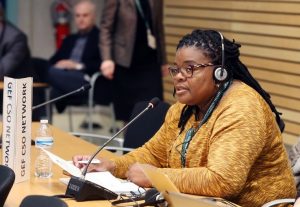
Maxi Pia Louis, (Director of ICCA Consortium Member NACSO) speaks on behalf of the GEF CSO Network during the GEF Council Meeting. Photo by IISD/Francis Dejon.
In the first roundtable, Maxi Pia Louis (Director of the Namibian Association of Community Based Resource Management (NACSO), ICCA Consortium Member) highlighted the importance of recognising and engaging with local communities as conservation leaders, including in wildlife conservation and monitoring and anti-poaching strategies. John Kamanga (South Rift Association of Land Owners (SORALO), Kenya) shared lessons from Maasai communities’ conservation areas, highlighting their roles as custodians.
In the second roundtable, a panel of speakers presented different models through which local communities can benefit economically from wildlife conservation and management. An initiative in Colombia presented by Clara Sierra (ASOCAIMAN, Colombia) showed how former crocodile hunters leading species monitoring with continued sustainable use has led to a 200% increase in the crocodile population in the last two decades.
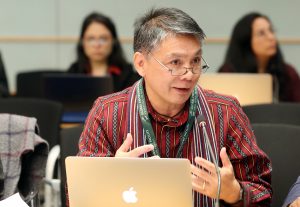
Giovanni Reyes (Philippine ICCA Consortium, GEF Indigenous Peoples Advisory Group Member, and ICCA Consortium Honorary Member) during the CSO Dialogue with GEF CEO Naoko Ishii. Photo by IISD/Francis Dejon.
During the open roundtable discussions, several participants spoke about Indigenous peoples’ and local communities’ leadership and collective action. Giovanni Reyes (President of BUKLURAN, Philippine ICCA Consortium) raised the critical need to recognise and support Indigenous peoples and local communities as the rightful custodians of their territories of life, including for effective wildlife conservation. He shared specific examples such as how the iconic Philippine Eagle, a rare bird of prey, is conserved in large part through the Bagobo-Bagawa peoples’ customary rules against disturbing areas surrounding the eagles’ nests. Florentina Julius (CBNRM Coordinator, Tanzania Natural Resource Forum (TNRF), national catalytic organisation in Tanzania) raised the point that many local communities are already demonstrating their leadership and support for wildlife conservation, including by setting aside land, but in many cases their efforts are not met with appropriate economic or other support.
Rosie Cooney (ICCA Consortium Honorary member and GEF Scientific and Technical Advisory Panel member) summarised the afternoon’s discussion, noting the complexity and urgency of illegal wildlife trade and the importance of recognising and empowering the leadership and capacity of communities in combatting it.
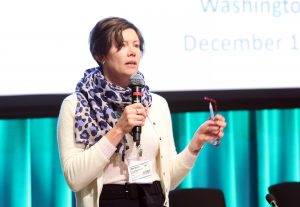
Rosie Cooney (ICCA Consortium Honorary member and GEF Scientific and Technical Advisory Panel member) during the CSO consultation on illegal wildlife trade. Photo by IISD/Francis Dejon.
READ MORE: “Local Commons for Global Benefits: Indigenous and community-based management of wild species, forests, and drylands” – Report lead authored by ICCA Consortium Honorary members Rosie Cooney and Brian Child for the GEF Scientific and Technical Advisory Panel
2. 57th GEF Council Meeting (17 – 19 December 2019)
The following are highlights on three Council Meeting agenda items that are of particular relevance to the ICCA Consortium membership. The full agenda and related documents are available online.
a. Inclusive Conservation Initiative
The GEF Council approved the ‘Inclusive Conservation Initiative’ concept, a USD 22.5 million+ Initiative that aims to, inter alia:
“assist Indigenous Peoples and Local Communities (IPLCs) in their efforts to continue to safeguard a significant fraction of Earth’s natural ecosystems by enabling organizations and communities on the ground to face the growing drivers of global environmental degradation… [It] will empower IPLCs to deliver global environmental benefits through access to larger volumes of resources required for larger-scale biodiversity conservation and natural resource management activities. Inclusive Conservation Initiative will enhance IPLCs efforts to steward land, waters and natural resources to deliver global environmental benefits…” (GEF/C.57/07, para 19(c)).
The full document for the Inclusive Conservation Initiative was not yet available during the GEF Council meeting and the full project will be developed in the course of 2020. A summary of the Initiative in the Work Program (GEF/C.57/07, para 19(c)) notes the limited scope of existing Indigenous peoples’ and local communities’ support initiatives; highlights the expanse of high biodiversity territories they manage, govern, and effectively conserve; and recognises that “[a]pproximately 40 percent of land listed by governments as under conservation is managed by IPLCs, which means they are critical to reaching the Aichi Target on the effective management of protected areas and associated SDGs…” The Initiative is expected to be implemented in 8-10 countries (to be determined) and expected to include activities such as: “establishing and supporting on-the-ground projects led by IPLC organizations”; “strengthening the capacity of IPLC organizations including increased access to long-term sustainable financing mechanisms”; “supporting targeted engagement in international environmental policy fora and relevant international platforms; and “promoting knowledge sharing” (GEF/C.57/07, para 19(c)).
The Inclusive Conservation Initiative is being developed in consultation with the GEF Indigenous Peoples Advisory Group (IPAG). Two IPAG leaders on this effort – Lucy Mulenkei (IPAG Chair and Executive Director of the Indigenous Information Network) and Giovanni Reyes (President of BUKLURAN, the Philippine ICCA Consortium) – were specifically acknowledged during the Council proceedings. (View or read an interview with Giovanni during the GEF Council here).
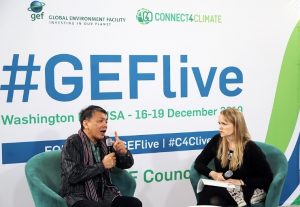
Giovanni Reyes (Philippine ICCA Consortium, GEF Indigenous Peoples Advisory Group Member, and ICCA Consortium Honorary Member) is interviewed by Sarah Wyatt (GEF Secretariat) during the GEF Council Meeting. Watch or read about his interview here. Photo by IISD/Francis Dejon.
This is the first GEF initiative of its kind, and a welcome step in a promising direction. At the same time, the partnerships and pathways for its development, implementation and review will critically determine its success. As this Initiative moves forward, the ICCA Consortium urges GEF and the implementing Agencies to remain committed to a vision of and action on ‘inclusive conservation’ that is defined by and firmly centres the empowered leadership, knowledge and self-determined visions and priorities of Indigenous peoples and local communities who are custodians of territories of life. Specific recommendations for legislators, policy makers and other conservation actors are set out in the ICCA Consortium’s Policy Brief No. 5 on “Whose Inclusive Conservation?” (English | Español). The GEF CSO Network also provided a detailed statement and recommendations on the Inclusive Conservation Initiative, stating that it “should be firmly based on the leadership of Indigenous peoples and local communities, including in all related decision-making, planning, implementation, and monitoring and evaluation, and should recognize and appropriately support the continuation and enhancement of their self-determined collective action for conservation in their territories and areas”.
b. Report on GEF Agencies’ Compliance with Minimum Standards
GEF Council Members were presented with a “Report on the Assessment of GEF Agencies’ Compliance with Minimum Standards …” (GEF/C.57/05). This report is based on a review of the 14 GEF Partner Agencies’ compliance with the minimum standards sets forth in the GEF Policies on Environmental and Social Safeguards, Gender Equality, and Stakeholder Engagement. The review found that a number of Agencies are not yet in full compliance with certain minimum standards, including the two Agencies selected to administer the Inclusive Conservation Initiative (Conservation International and IUCN). The report also noted the Agencies’ action plans for coming into full compliance. The Council asked the GEF Secretariat to share updates on Agencies’ implementation of these action plans.
c. Guidelines on GEF’s Policy on Environmental and Social Safeguards
GEF has developed Guidelines to help implement its Policy on Environmental and Social Safeguards (GEF/C.55/07) (which was updated in 2018). These Guidelines elaborate the project and program level documentation and reporting requirements for GEF Agencies, Secretariat, and Operational Focal Points throughout the GEF Project Cycle. Civil society can use these as a source of information on GEF Agencies’ and other actors’ obligations in relation to GEF projects.
3. Going forward…
- The GEF Council selected two topics for the 2020 GEF Consultations with CSOs, both of which may be of interest to ICCA Consortium Members, namely: “The Application of Traditional Knowledge by Indigenous Peoples and Local Communities, Stewards of the Global Environment” (June 2020); and “Enhancing Climate Resilience and the Role of Civil Society, Local Communities and Indigenous Peoples” (December 2020).
- The GEF webpage for CSOs notes a number of avenues for engagement, including information on how to comment on project proposals and make a complaint or raise a grievance concerning GEF projects.
- Contact your GEF CSO Network Regional Focal Point for more information, including about GEF projects in your country or region.
4. For more information…
- ICCA Consortium Policy Brief No. 5: “Whose Inclusive Conservation?” (English | Español)
- GEF summaries of each day’s key decisions from the Council Meeting and links to videos.
- GEF links to the 57th Council Meeting agenda and related documents.
- IISD Reporting Services’ detailed coverage of each day’s proceedings.
- The CSO Network Statement on GEF Work Program – 57th GEF Council Meeting.
Featured image: Lucy Mulenkei (Indigenous Information Network and Chair of GEF Indigenous Peoples Advisory Group) during the CSO Dialogue with GEF CEO Naoko Ishii. Photo by IISD/Francis Dejon.
